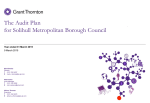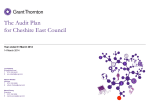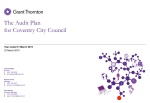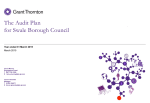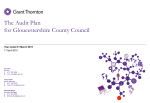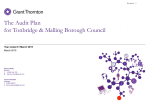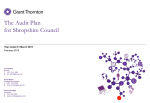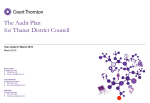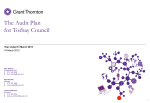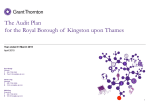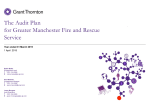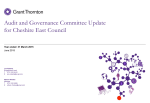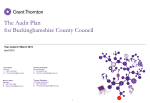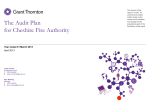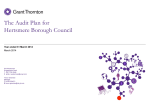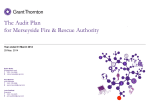Download The Audit Plan – template user guide
Transcript
The Audit Plan for Cheshire East Council Year ended 31 March 2015 March 2015 Jon Roberts Partner T 0121 232 5410 E [email protected] Allison Rhodes Manager T 0121 232 5285 E [email protected] Lisa Morrey Executive T 0121 232 5302 E [email protected] © 2015 Grant Thornton UK LLP | The contents of this report relate only to the matters which have come to our attention, which we believe need to be reported to you as part of our audit process. It is not a comprehensive record of all the relevant matters, which may be subject to change, and in particular we cannot be held responsible to you for reporting all of the risks which may affect the Council or any weaknesses in your internal controls. This report has been prepared solely for your benefit and should not be quoted in whole or in part without our prior written consent. We do not accept any responsibility for any loss occasioned to any third party acting, or refraining from acting on the basis of the content of this report, as this report was not prepared for, nor intended for, any other purpose. Contents Section Page Understanding your business 4 Developments relevant to your business and the audit 5 Our audit approach 6 Significant risks identified 7 Other risks identified 8 Group scope and risk assessment 9 Value for Money 10 Interim audit work 11 Key dates 13 Fees 14 Independence 15 Communication of audit matters with those charged with governance 16 Appendices A. Key issues and recommendations 2013/14 © 2015 Grant Thornton UK LLP | 17 3 Understanding your business In planning our audit we need to understand the challenges and opportunities the Council is facing. We set out a summary of our understanding below. Challenges/opportunities 1. Financial environment 2. Alternative Delivery Models 3. Capital programme 4. Collaborative working with the NHS Local government continues to face financial challenges with the Government's spending settlement showing local authorities are facing a cash reduction in their spending power of 6% in 2015/16 at a time of increasing demand for council services such as school places and adult social care services. The Council is providing a range of services under various alternative delivery models including local authority companies and a charitable trust. The Council has an ambitious capital programme and uses this as a mechanism to leverage investment from Government and the private sector and to further the Council's plans for economic growth. The Better Care Fund is a single pooled budget from April 2015 for health and adult social care services to work more closely together in local areas. The Council secures 78% of its net funding from council tax and business rates and so its reliance on central government grant is relatively low. The changes to the way in which service are delivered also impact upon the Council's governance arrangements and the accounting requirements. The Council has reviewed the capital programme and capital spending for 2014/15 is forecast at £102.6 million. The future capital programme for the three years to 2018 amounts to £455 million. The Council has set a balanced budget for 2015/16 and estimated a financial gap of £36 million over 2016/17 and 2017/18. Savings proposals are to be developed to close the gap reflected in the medium term financial strategy. The Council and its partners developed a Better Care Fund plan for 2015/16 with £23.9 million being pooled locally. As the Better Care Fund accelerates the integration of health and social care in the longer term and as net expenditure on adult services is 36% of the Council's budget, managing costs in this area is essential. . Our response We will review the financial outturn for 2014/15 and your Medium Term Financial Strategy as part of our work on your arrangements for financial resilience. © 2015 Grant Thornton UK LLP | As part of our work for the VFM conclusion, we will review the Council's performance in key service areas. As part of our work for the value for money conclusion, we will review the Council's progress against its capital strategy. As part of our audit of your financial statements, we will review your assessment against the requirements for group accounts. We will review your consolidation process and liaise with our commercial audit colleagues, as auditors of the local authority companies and audit your group accounts. Our audit of the Council's financial statement will review the accounting treatment of capital investment and financing transactions. 4 We will monitor the Council's progress in preparing for its role under the Better Care Fund. We will report our findings as part of our work relating to the VFM conclusion work. Developments relevant to your business and the audit In planning our audit we also consider the impact of key developments in the sector and take account of national audit requirements as set out in the Code of Audit Practice ('the code') and associated guidance. Developments and other requirements 1.Financial reporting 2. Legislation 3. Corporate governance 4. Financial Pressures 5. Other requirements Changes to the CIPFA Code of Practice Local government finance settlement Annual Governance Statement (AGS) Managing service provision with less resource Adoption of new group accounting standards which affect how local authorities account for services delivered through other entities and joint working with partners Care Act 2014 Explanatory foreword Progress against savings plans The Council is required to submit a Whole of Government Accounts (WGA) pack on which we provide an audit opinion The Council completes grant claims and returns on which audit certification is required Accounting for schools including changes to the recognition of land and buildings on the Council's balance sheet. Our response Through our discussions with management and our substantive testing we will consider whether: the Council complies with the requirements of the CIPFA Code of Practice schools are accounted for correctly and in line with the Code and accounting standards We will discuss the impact of legislative changes with the Council through our regular meetings with senior management and those charged with governance, providing a view where appropriate. We will review the arrangements the Council has in place for the production of the AGS. We will review the AGS and the explanatory foreword to consider whether they are consistent with our knowledge. financial performance throughout the year through review of reports, consideration of the medium term financial plans and discussion with management. We will undertake a review of Financial Resilience as part of our VFM conclusion. your application of group accounting requirements is appropriate. We will also consider the progress made against issues raised in the 2013/14 audit. © 2015 Grant Thornton UK LLP | We will monitor the Council's 5 We will carry out work on the WGA pack in accordance with requirements. We will certify the housing benefit subsidy claim in accordance with the requirements specified by Public Sector Audit Appointments Ltd. This company will take over the Audit Commission's responsibilities for housing benefit grant certification from 1 April 2015. Our audit approach Ensures compliance with International Standards on Auditing (ISAs) Global audit technology Understanding the environment and the entity Understanding the business Inherent risks Significant risks Understanding management’s focus Other risks Evaluating the year’s results Material balances Develop audit plan to obtain reasonable assurance that the Financial Statements as a whole are free from material misstatement and prepared in all materiala respects with the CIPFA Code of Practice framework using our global methodology and audit software Devise audit strategy (planned control reliance?) Yes Extract your data Test controls Test of detail IDEA Substantive Substantive Analyse data analytical analytical Report output using relevant review review to teams parameters Tests of detail General audit procedures Note: a. An item would be considered material to the financial statements if, through its omission or nondisclosure, the financial statements would no longer show a true and fair view. Financial statements Conclude and report Creates and tailors audit programs © 2015 Grant Thornton UK LLP | No Stores audit evidence Documents processes and controls Significant risks identified 'Significant risks often relate to significant non-routine transactions and judgmental matters. Non-routine transactions are transactions that are unusual, either due to size or nature, and that therefore occur infrequently. Judgmental matters may include the development of accounting estimates for which there is significant measurement uncertainty' (ISA 315). In this section we outline the significant risks of material misstatement which we have identified. There are two presumed significant risks which are applicable to all audits under auditing standards (International Standards on Auditing – ISAs). Significant risk Description Audit procedures The revenue cycle includes fraudulent transactions Under ISA 240 there is a presumed risk that revenue may be misstated due to the improper recognition of revenue. Having considered the risk factors set out in ISA240 and the nature of the revenue streams at Cheshire East Council, we have determined that the risk of fraud arising from revenue recognition can be rebutted, because: • • • Management over-ride of controls © 2015 Grant Thornton UK LLP | Under ISA 240 there is a presumed risk that the risk of management over-ride of controls is present in all entities. 7 there is little incentive to manipulate revenue recognition opportunities to manipulate revenue recognition are very limited the culture and ethical frameworks of local authorities, including Cheshire East Council, mean that all forms of fraud are seen as unacceptable. Work planned: Discuss with management the rationale and evidence to support key accounting estimates and judgements. Review of accounting estimates, judgments and decisions made by management Testing of journal entries Review of unusual significant transactions Other risks identified The auditor should evaluate the design and determine the implementation of the entity's controls, including relevant control activities, over those risks for which, in the auditor's judgment, it is not possible or practicable to reduce the risks of material misstatement at the assertion level to an acceptably low level with audit evidence obtained only from substantive procedures (ISA 315). In this section we outline the other "reasonably possible" risks of material misstatement which we have identified as a result of our planning. Other reasonably possible risks Operating expenses Description Work programme Creditors understated or not recorded in the correct period (operating expenses understated) We will document the processes and controls in place around the accounting for operating expenses and carry out walkthrough tests to confirm the operation of controls. We will carry out testing including: the completeness of the subsidiary system interfaces and control account reconciliations obtaining an understanding of the accruals process and testing a sample accruals cut off testing of purchase orders and goods received notes (both before and after year end). Testing will also cover a sample of operating expenses covering the period 1/4/14 to 31/3/15 to ensure they have been accurately accounted for and in the correct period. Employee remuneration Employee remuneration accrual understated (remuneration expenses not correct) We will document the processes and controls in place around the accounting for employee remuneration and carry out walkthrough tests to confirm the operation of controls. We will carry out testing including: the completeness of the payroll reconciliation to ensure that information from the payroll system can be agreed to the ledger and financial statements a review of monthly trend analysis of total payroll substantive testing of senior officer remuneration. Testing will also cover a sample of employee remuneration payments covering the period 1/4/14 to 31/3/15 to ensure they have been accurately accounted for and in the correct period. Welfare Expenditure Welfare benefit expenditure improperly computed We will document the processes and controls in place around the accounting for welfare benefits and carry out walkthrough tests to confirm the operation of controls. We will perform the initial testing of benefit expenditure in accordance with the HBCOUNT methodology required to certify the housing benefit subsidy claim. We will review the reconciliation between the benefits system and general ledger. © 2015 Grant Thornton UK LLP | 8 Group audit scope and risk assessment ISA 600 requires that as Group auditors we obtain sufficient appropriate audit evidence regarding the financial information of the components and the consolidation process to express an opinion on whether the group financial statements are prepared, in all material respects, in accordance with the applicable financial reporting framework. The Council has completed an initial assessment against the requirements of IFRS 10 consolidated financial statements and IFRS 11 Joint arrangements and determined that Group Accounts will be prepared to incorporate the financial results of four wholly owned subsidiary companies (Ansa Environmental Services Ltd, Orbitas Bereavement Services Ltd, Transport Service Solutions Ltd & East Cheshire Engine of the North Ltd) along with CoSocius Ltd as a joint venture. The Council has determined that other subsidiaries & associates (Cheshire East Residents First Ltd ,Tatton Park Enterprises Ltd, Cheshire & Warrington Enterprise Ltd) may be excluded from the group accounts on the basis that this does not have a material impact. Investment in other entities such as Everybody Sport and Leisure Trust (ESAR) are not to be consolidated as the Council does not have ‘control’. We will consider the Council's assessment of the group boundary and the adequacy of the determination of those entities that are to be included within Group Accounts in 2014/15. We will also review the approach to align the accounting policies, review the consolidation adjustments and assess whether the disclosures within the group financial statements are in accordance with the Code requirements. Our work will also consider the adequacy of the specific disclosures for interests that are not incorporated into the group accounts. The table below considers whether the 'components' to be consolidated into the group accounts are anticipated to be individually significant or whether the risk of material misstatement can be addressed by applying analytical procedures at the group level. Level of Component Significant? Cheshire East Residents First Ltd: • Ansa Environmental Services Ltd • Orbitas Bereavement Services Ltd • Transport Solutions Ltd • Engine of the North Ltd Yes (to be reassessed based on the financial impact for each of the companies) response required under ISA 600 Targeted Risks identified Planned audit approach At this stage we have identified no specific risks of material misstatement. Liaison with the finance team to discuss any complex matters, emerging issues or areas of difficulty. Nevertheless this is the first year of operation for the new companies and of the preparation of group financial statements and so there are additional challenges and some risk of error as these new arrangements are established. Liaison with the auditors of the Council's companies (also Grant Thornton UK LLP but a separate team). We will inform the Audit and Governance Committee of any changes to this assessment. CoSocius Ltd : 50% joint venture interest which commenced trading with effect © from 2015 Grant Thornton UK LLP | 1 May 2014. No Analytical N/A Specific (targeted) scope procedures to be performed depending on the arrangements for the holding company and the significance of each of the components. Review of the Council's consolidation of the financial results of the subsidiary into the group accounts. Analytical procedures at the group level - desktop review of the Council's consolidation of the financial results of the joint venture into the group accounts using the 'equity' method. Value for money Value for money The Code requires us to issue a conclusion on whether the Council has put in place proper arrangements for securing economy, efficiency and effectiveness in its use of resources. This is known as the Value for Money (VfM) conclusion. We undertake a risk assessment to identify areas of risk to our VfM conclusion. Following on from our work in 2013/14 we will review progress against our recommendations in 2013/14 (at Appendix A) and undertake work in the following areas to address the risks identified: Our VfM conclusion is based on the following criteria specified by the Audit Commission: • Review the Council's progress in developing its financial strategy for 2015/16 and beyond and how changes to the delivery of services, with the Council's move to become a strategic commissioning council, are reflected in governance arrangements and financial plans. • Review the developments in the Council's capital planning and reporting process. • Review the Council's progress in preparing for its role under the Better Care Fund. VfM criteria Focus of the criteria The organisation has proper arrangements in place for securing financial resilience The organisation has robust systems and processes to manage financial risks and opportunities effectively, and to secure a stable financial position that enables it to continue to operate for the foreseeable future The organisation has proper arrangements for challenging how it secures economy, efficiency and effectiveness © 2015 Grant Thornton UK LLP | The results of our VfM audit work and the key messages arising will be reported in our Audit Findings report and in the Annual Audit Letter. The organisation is prioritising its resources within tighter budgets, for example by achieving cost reductions and by improving efficiency and productivity 10 Interim audit work We will report the results of our interim work to the March meeting of the Audit Committee. The work to be carried out is detailed in the table below. Should the outcome of our interim work impact upon our overall audit plan and strategy, we will report any changes back to those charged with governance. Internal audit Work to be performed Outcome of the work to be performed We complete a high level review of internal audit's overall arrangements. We will conclude whether the internal audit service continues to provide an independent and satisfactory service to the Council and that internal audit work contributes to an effective internal control environment at the Council. We also review internal audit's work on the Council's key financial systems to date. Our review of internal audit work will identify whether there are any weaknesses which impact on our audit approach. Walkthrough testing We complete walkthrough tests of controls operating in areas where we consider that there is a risk of material misstatement to the financial statements. We will conclude whether our work has identified any weaknesses which impact our audit approach. Entity level controls We will obtain an understanding of the overall control environment relevant to the preparation of the financial statements including: We will conclude whether our work has identified any material weaknesses which are likely to adversely impact on the Council's financial statements Review of information technology controls • Communication and enforcement of integrity and ethical values • Commitment to competence • Participation by those charged with governance • Management's philosophy and operating style • Organisational structure • Assignment of authority and responsibility • Human resource policies and practices We carry out a high level review of the general IT control environment, as part of the overall review of the internal controls system. We will also follow up the issues raised last year. As the Council uses Oracle which is an inherently complex financial system, our IT specialists will carry out this review. © 2015 Grant Thornton UK LLP | 11 We will conclude whether our work identifies any material weaknesses which are likely to adversely impact on the Council's financial statements. Interim audit work continued Journal entry controls Work performed Outcome of the work to be performed We review the Council's journal entry policies and procedures as part of determining our journal entry testing strategy. The work will identify whether there any material weaknesses which are likely to adversely impact on the Council's control environment or financial statements. We will carry out testing on journals for months 1-10. Value for Money Conclusion We will carry out an initial review of the Council's arrangements for securing economy, efficiency and effectiveness in its use of resources. The work will inform our conclusion on the arrangements to secure value for money. Early substantive testing We will carry out early and/or part year testing in the following areas: The work will inform our approach to the audit of the Council's accounts and contribute to the assurance for material items. Other work to be performed © 2015 Grant Thornton UK LLP | - sample of employee remuneration payments - sample of operating expenses payments - PFI accounting models and disclosures - employee remuneration trend analysis - agreement of significant grant notifications - group accounts assessment - precept demands - PPE opening balances - related party transactions - NDR appeals process - bank reconciliation. We will follow up the Council's progress in implementing the recommendations made our Audit Findings report for 2013/14 (Appendix A) 12 The work will inform our approach to the audit of the Council's accounts and also our conclusion on the arrangements to secure value for money. Key dates The audit cycle March 2015 Interim audit visit June-Aug 2015 September 2015 Final accounts Visit Completion/ reporting September 2015 Debrief Key phases of our audit 2014-2015 © 2015 Grant Thornton UK LLP | Date Activity January – February 2015 Planning March 2015 Interim site visit March 2015 Presentation of initial audit plan to Audit and Governance Committee July 2015 September 2015 Year end fieldwork September 2015 Audit findings clearance meeting September 2015 Report audit findings to those charged with governance (Audit and Governance Committee) September 2015 Sign financial statements opinion 13 Fees Fees Other Audit Services £ Council audit Grant certification Total fees (excluding VAT) £ 206,120 Reasonable Assurance report for teachers pension return December 2014 4,800 Total fees (excluding VAT) 4,800 32,500 238,620 Our fee assumptions include: Grant certification Supporting schedules to all figures in the accounts are supplied by the agreed dates and in accordance with the agreed upon information request list The scope of the audit, and the Council and its activities, have not changed significantly Our fees for grant certification cover only housing benefit subsidy certification, which falls under the remit of Public Sector Audit Appointments Limited, as the successor to the Audit Commission in this area. The Council will make available management and accounting staff to help us locate information and to provide explanations. Fees in respect of other grant work, such as reasonable assurance reports, are shown under 'Fees for other services.' The actual certification fees for 2014/15 may be higher or lower than the indicative fee determined by the Audit Commission and stated above, because the auditor is required to undertake more or less work compared to 2012/13 on which the fee is based. It is important to note that the introduction of group accounting requirements is a change in the scope of the audit that requires additional audit work to meet the requirements of International Standards on Auditing (ISA) 600. This additional work is not reflected in the scale fee previously determined by the Audit Commission. The proposed amendment will be discussed with the Chief Operating Officer and must also be approved by the Public Sector Audit Appointments Ltd (successor body to the Audit Commission). © 2015 Grant Thornton UK LLP | Fees for other services Fees for other services reflect those agreed at the time of issuing our Audit Plan. Any changes will be reported in our Audit Findings Report and Annual Audit Letter. 14 Independence Independence and ethics Ethical standards and International Standards on Auditing (ISA) 260 require us to give you full and fair disclosure of matters relating to our independence. In this context, we have previously reported to the Audit and Governance Committee, the safeguards to mitigate the threat to the independence of the auditor arising from the appointment of the former Engagement Lead to the post of Head of Corporate resources and Stewardship (Deputy Section 151 officer). These arrangements have been agreed with the Audit Commission and are repeated below. We have complied with the Auditing Practices Board's Ethical Standards and therefore we confirm that we are independent and are able to express an objective opinion on the financial statements. Full details of all fees charged for audit and non-audit services will be included in our Audit Findings report at the conclusion of the audit. We confirm that we have implemented policies and procedures to meet the requirement of the Auditing Practices Board's Ethical Standards. Safeguards to mitigate the threat to the independence of the auditor In January 2014 Judith Tench joined Cheshire East Council as Head of Corporate Resources and Stewardship (Deputy s151 Office). Judith was formerly employed by Grant Thornton UK LLP and was the engagement lead for the external audit of the Council. This appointment poses a threat (actual or perceived) to the independence of the auditor. In these circumstances we have taken actions to safeguard the independence of the firm and of the auditor, in accordance with the Ethical Standards and the Audit Commission's Standing Guidance. A summary of these safeguards are set out below. We will also disclose this threat and these safeguards in our audit findings report. We have discussed these safeguards with the Council's Leader, Chief Executive and Chief Operating Officer. We have also discussed and agreed these safeguards with the Audit Commission. The following safeguards are in place for 2014/15: • Judith withdrew from the audit team as soon as she advised her interest in applying for the role at the Council and alternative arrangements were put in place to discuss and finalise the Annual Audit Letter and to certify two grant claims. This concluded the 2012/13 audit. • For the 2013/14 audit all senior members of the team were replaced by individuals who have not previously worked with Judith. • As an additional safeguard the team are from another Grant Thornton region (Midlands) and are headed up by the Regional Lead Partner for the Midlands - Jon Roberts. Your audit team also includes Allison Rhodes and Lisa Morrey. • The audit engagement team will not conduct any meetings with Judith without another Council officer being present. This additional safeguard will continue until January 2016. • In addition we confirm that Judith has no residual financial relationships with the firm. © 2015 Grant Thornton UK LLP | 15 Communication of audit matters with those charged with governance International Standards on Auditing (ISA) 260, as well as other ISAs, prescribe matters which we are required to communicate with those charged with governance, and which we set out in the table opposite. This document, The Audit Plan, outlines our audit strategy and plan to deliver the audit, while The Audit Findings will be issued prior to approval of the financial statements and will present key issues and other matters arising from the audit, together with an explanation as to how these have been resolved. Our communication plan Audit Plan Respective responsibilities of auditor and management/those charged with governance Overview of the planned scope and timing of the audit. Form, timing and expected general content of communications Audit Findings We will communicate any adverse or unexpected findings affecting the audit on a timely basis, either informally or via a report to the Council. Views about the qualitative aspects of the entity's accounting and financial reporting practices, significant matters and issue arising during the audit and written representations that have been sought Respective responsibilities Confirmation of independence and objectivity This plan has been prepared in the context of the Statement of Responsibilities of Auditors and Audited Bodies issued by the Audit Commission (www.auditcommission.gov.uk). A statement that we have complied with relevant ethical requirements regarding independence, relationships and other matters which might be thought to bear on independence. We have been appointed as the Council's independent external auditors by the Audit Commission, the body responsible for appointing external auditors to local public bodies in England. As external auditors, we have a broad remit covering finance and governance matters. Details of non-audit work performed by Grant Thornton UK LLP and network firms, together with fees charged. Our annual work programme is set in accordance with the Code of Audit Practice ('the Code') issued by the Audit Commission and includes nationally prescribed and locally determined work. Our work considers the Council's key risks when reaching our conclusions under the Code. It is the responsibility of the Council to ensure that proper arrangements are in place for the conduct of its business, and that public money is safeguarded and properly accounted for. We have considered how the Council is fulfilling these responsibilities. © 2015 Grant Thornton UK LLP | 16 Details of safeguards applied to threats to independence Material weaknesses in internal control identified during the audit Identification or suspicion of fraud involving management and/or others which results in material misstatement of the financial statements Non compliance with laws and regulations Expected modifications to the auditor's report, or emphasis of matter Uncorrected misstatements Significant matters arising in connection with related parties Significant matters in relation to going concern Appendices © 2015 Grant Thornton UK LLP | 17 Appendix A: Key issues and recommendations 2013/14 This appendix summarises the key recommendations identified during the 2013/14 audit and reported in full in the Audit Findings Report. Issue and recommendation Property, plant and equipment and capital accounting: We made a number of recommendations relating to accounting for capital expenditure and financing and movements in the value of property plant and equipment. Recommendations: • The Council should ensure that it has appropriate arrangements in place to make a formal assessment of whether the carrying value of property plant and equipment is not materially different from the fair value at the end of the reporting period • We recommend that the Council complete a full review in 2014/15 of the underlying asset register and the associated capital expenditure to ensure appropriate application of the Code's requirements. • We recommend that the Council reviews its approach to capital accounting entries in 2014/15 and specifically its use of a dedicated capital receipts reserve and the capital grant unapplied account. Management response/ responsible officer/ due date The Council will ensure it has appropriate arrangements in place to make a formal assessment of whether the carrying value of property plant and equipment is not materially different from the fair value at the end of the reporting period. Earlier engagement will take place with the external valuers, Deloitte to ensure an assessment has been undertaken on all assets not subject to revaluation within the year. Responsible officer: Head of Corporate Resources and Stewardship Due date: March 2015 A full review of the asset register and associated capital expenditure will be undertaken in 2014/15 to ensure full consideration of the Code requirements. The requirement for a dedicated earmarked reserve for revenue contributions to future capital expenditure will be actioned in 2014/15. We will review the disclosure of the capital grant unapplied account as part of the 2014/15 accounts closedown process. Responsible officer: Corporate Finance Manager Due date: March 2015 © 2015 Grant Thornton UK LLP | Appendix A: Key issues and recommendations Issue and recommendation Management response/ responsible office/ due date PFI liability and disclosures: There are some differences between the Council 's overall PFI liability and 'future cost' disclosures and those estimated by the audit team using the GT model. The PFI liability is £5.358m below our range of estimates. The differences are due to the way in which the initial construction costs of the scheme were derived and apportioned over the properties involved in the scheme. We will review the initial construction costs within the accounting model - agreed in 2009/10. We will reconsider our accounting treatment in consultation with the auditors. Recommendation: We recommend that the Council reviews the initial construction costs within the accounting model. Responsible officer: Corporate Finance Manager Due date: March 2015 Receipts in advance: We made two recommendations relating to the treatment of grant income held as receipts in advance (represented by a liability on the balance sheet) as these may only be accounted for this way when there are formal conditions in place that prevent the funds from being recognised as income. Recommendations: • We recommend that the Council considers the accounting treatment of Dedicated Schools Grant and assess whether any balances to be carried forward each year would be more appropriately accounted for as an earmarked reserve. • We recommend that the Council reviews its remaining balances held as receipts in advance. © 2015 Grant Thornton UK LLP | We will review accounting treatment of the Dedicated Schools Grant as part of the 2014/15 closedown process. Responsible officer: Accountancy Services Manager Due date: March 2015 The Council will review balances held as receipts in advance to assess the appropriate accounting treatment. Responsible officer: Corporate Finance Manager Due date: March 2015 Appendix A: Key issues and recommendations Issue and recommendation Financial Governance Our work on the VFM Conclusion resulted in a number of recommendations to further improve aspects of financial governance. Recommendations: • Encourage focus of consideration and discussions of the Audit and Governance Committee to provide apolitical, effective oversight, support and challenge for the Council's financial management and the system of internal control. • Include key unit cost information within the performance management framework as a measure of financial performance alongside service delivery outcomes. • Demonstrate the improvements to the capital planning process, gateway reviews and managing the delivery of these projects to reduce the amount of slippage and inform accurate forecasting in 2014/15. Management response/ responsible office/ due date The Chief Operating Officer will continue to work with the Chairman/ViceChairman and the established Officer/Member groups to: • develop the role of the Committee; • further develop the approach to agenda planning; • provide an appropriate focus for debate; and • implement the improvement actions agreed in June 2014 in response to the effectiveness self-assessment. The Chief Operating Officer will consider appropriate use of unit costs in performance reports. For example, indicators such as % spending on professional services and £m spending on assets could be included alongside appropriate targets. Financial data, which forms part of the Commissioning Plans, will continue to be analysed and compared during the medium term financial planning cycle. The targets of remaining within a £14m Capital Financing Cap and also to restrict any new external borrowing will stay in place for 2015/16. The approach to the monitoring and management of capital profiling and forecasting will continue to be refined. This will provide a clear distinction between active management to re-profile expenditure and identification of genuine slippage against committed capital schemes. Responsible Officer: Chief Operating Officer Due date: March 2015 © 2015 Grant Thornton UK LLP | Appendix A: Key issues and recommendations Issue and recommendation Management response/ responsible office/ due date Alternative Service Delivery Vehicles As part of its move to become a commissioning council, the Council has challenged the way activities are delivered and explored new ways of delivering activities. Our work on the VFM Conclusion acknowledged the developments in financial control as the Council's alternative service delivery vehicles became operational. We also highlighted that looking forward, the Council is more likely to be subject to the requirement to prepare group accounts The Council will continue to: • review and develop the governance framework for ASDVs in the light of experience, and as operational arrangements mature, in accordance with the approach set out in the report to Cabinet in March 2014; and • embed quarterly monitoring of the operational and financial performance of its companies, within its usual reporting processes. Recommendation: Reassess the governance and risk management arrangements for the new ASDVs and the Council's commissioning relationship with them, to make sure that they are operating as intended and they enable the Council to sufficiently identify and address any risks to service delivery or internal controls. The development of group accounts will be considered as part of the planning arrangements for the 2014/15 closedown, in particular the resources and training requirements. We will discuss our proposals with the auditors at an early stage. Responsible Officers: Chief Operating Officer and Executive Director Strategic Commissioning Due date: Ongoing The assessment of the scope and application of group accounts requirements should be identified and factored into closedown arrangements. Better Care Fund Another aspect to changing service delivery is the integration promoted through the Better Care Fund. We reported that the initial Better Care Fund plans submitted in April 2014 did not include details of specific schemes, financial plans, risk assessment or fully developed key performance indicators. The Council is continuing to develop the Better Care Fund arrangements with its Clinical Commissioning Group partners. Further assessments of progress are being undertaken by the Department of Health. The Council, along with its partners is continuing to develop, discuss and assess progress in line with Department of Health Guidance. More detailed plans are submitted in September 2014. Recommendation: Throughout 2014/15, the partners need to work together to develop and apply the plans to integrate care and support services across the county area. Responsible Officers: Executive Director of Strategic Commissioning and Director Adult Social Care Due date: March 2015 © 2015 Grant Thornton UK LLP | Appendix A: Key issues and recommendations Issue and recommendation Management response/ responsible office/ due date Overall we are satisfied that the Council has adequate arrangements in place to improve efficiency and productivity. We noted the further developments underway in specific areas. Recommendations: • Review the Data Quality Strategy and the associated measures as part of the Transparency Project to promote the importance of good quality data in effective information governance. • Continue to improve procurement arrangements, effectively linking these with contract management and commissioning activities to avoid duplication and maximise savings to be secured. The current Data Quality Strategy will be reviewed to ensure that it remains fit for purpose. A fundamental review of the Strategy will be undertaken as part of the Council’s developing approach to increasing transparency. The Council’s Procurement Improvement Plan is being implemented - overseen by the Procurement Board. The work includes a review of Contract Procedures Rules, introduction of Risk Based Sourcing, enhancing the ability of local suppliers to compete for Council contracts. A review of all commissioning activity is scheduled to ensure that the Council is able to maximise the savings and value for money of all contract renewals. Responsible Officer: Chief Operating Officer Due date: March 2015 • Continue to implement the recommendations arising from the Ofsted inspection and improvement notice regarding the arrangements for the protection of children. External evaluation, including the Ofsted improvement pilot and Local Government Association Peer Review, has confirmed that good progress has been made in improving safeguarding arrangements for children in Cheshire East. As at the end of March 2014, a significant number of Ofsted and Improvement Notice recommendations have been ‘signed off’ by the Improvement Board. A new Children’s Improvement Plan for 2014-15 has been approved by the Improvement Board to meet the outstanding recommendations. Audit and other activity is also now monitored by the multi-agency Local Safeguarding Children Board. Responsible Officer: Director of Children's Services Due date: The Improvement Notice will not be lifted until the next inspection (unannounced) © 2015 Grant Thornton UK LLP | © 2015 Grant Thornton UK LLP. All rights reserved. 'Grant Thornton' means Grant Thornton UK LLP, a limited liability partnership. Grant Thornton is a member firm of Grant Thornton International Ltd (Grant Thornton International). References to 'Grant Thornton' are to the brand under which the Grant Thornton member firms operate and refer to one or more member firms, as the context requires. Grant Thornton International and the member firms are not a worldwide partnership. Services are delivered independently by member firms, which are not responsible for the services or activities of one another. Grant Thornton International does not provide services to clients. grant-thornton.co.uk 23























